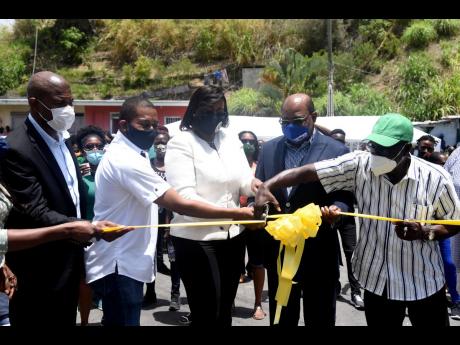Holness sets new template for road repairs
The Method used to rehabilitate the Guava Ridge to Content Gap main road in East Rural St Andrew has set a new template for road development in Jamaica.
St Andrew East Rural Member of Parliament Juliet Holness told the official opening ceremony of the Guava Ridge to Content Gap main road on Wednesday that their decision to await the installation of pipelines, culverts and other infrastructural work before the paving of the roadway was a hard sacrifice for the community but one well worth the wait.
The allocation for the resurfacing was made available about two years ago, but after discussion with her constituents, Holness took a message to Senior Director for Project Implementation in the National Works Agency, Varden Downer.
“The road came before the water, but I said, Mr Downer, not even one drop of asphalt before you lay the pipes, because if we ever get road before you lay the pipe, any day the NWC (National Water Commission) come and dig it up to lay pipe, we will never see good road again.
“So we waited as a community, because we were adamant that we wanted all our pipes laid under the road and all our water problems resolved. We got all the drainage we needed. We got all the (retaining) walls built that we needed. All I am asking you now is for you to slow down on the road. Although the asphalt is pretty, we need to ensure that we are still travelling safely on our roads.”
Meanwhile, Downer told The Gleaner that this is the new template for road construction or rehabilitation in Jamaica.
“The Government has instructed that for any major improvements, we will include our water line and sewer, where possible, in collaboration with the water commission and in addition, we will work with the telecoms companies to put in the necessary infrastructure, where applicable ... . The same thing applies to the JPS (Jamaica Public Service Company), where we work together; so it’s now infrastructure development and not just a road improvement that we do.
“Some of the projects that we are working on now on the south coast, those major projects, the legacy projects – Barbican, Constant Spring, Hagley Park – they are being done that way,” he explained.
Among those applauding this long-awaited major road-improvement project were President of the Kingston and St Andrew Association of Branch Societies of the Jamaica Agricultural Society (JAS), Albert ‘Jack’ Green, and Secretary of the Content Gap JAS branch, Denise Green.
EFFICIENT TRAVELLING
Green spoke to ease of movement which should result in faster turnaround times for farmers, who would no longer need to charter vehicles to get from one point to another.
“Now they can just jump on the public passenger vehicle from St Peters to Papine or even to Coronation market, so it adds some value,” he said.
Green is looking forward to the improved conditions of farmers’ produce when it is delivered to consumers.
“We are grateful for the road, because now when we are going to the market, our crops will reach in better condition. Before, when they travelled on the bad roads, conditions were so terrible that ‘them soft up’, so the people always have to sell them at a reduced price. Now we will be able to sell our produce at the right price, because we have better road,” she told The Gleaner.

